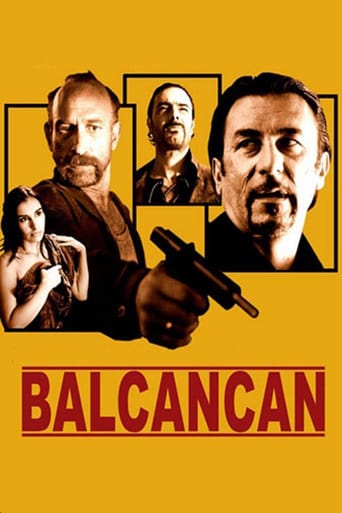igorgrujovski
I think the movie was very funny, and it had a special allegory, for example: there was any characters that in fact represented their countries, and the main character, Trendafil, represents Macedonia, country born in wars and slavery(Trendafil was born in jail :D) and behind the character of Dzango-war profiteers, behind the albanian smugglers,dealers and slave owners, well-there is nothing hidden there- they are represented as they really are...In the end, Trendafil overcomes his fear of war and violence and leads the children to freedom. This is highly symbolic. The whole script has nothing to do with reality, except the part about Kosovo, it is really a place of criminals smugglers, human trafficking and all sorts of violence. 80% of Europe's heroin come trough kosovo and their gangs are responsible for distribution of weapons and prostitutes through out europe...
dusan-22
Pretty good, black humor style, Fellini style. Well composed portrait on one nation that was called Yugoslav the last time of its existence. Very well depicted characters of the regions on last 20 years of history but also much behind. Their path of national tragedy and destiny, rather than political. Dark picture, linked more to social and psyhological profile of the people than to living standards of the region. Very convincing acting, especially of the leading role - Trendafil, but sometimes brilliant when speaking of the minor roles, like the guy who plays Prkachin in the Bosnian village. Would recommend this film and give it 7 out of 10.
Stanislav
9/10Ruza and her husband Trendafil Karanfilov live together with "baba Zumbula" (granny Zumbula). Even though they have names like flowers, their life is no picnic. They can hardly afford the food for a food fight. But they have even bigger problem; the war is starting in their country. As much as they are unhappy with the war, their neighbor Dzango Sapun couldn't be more happier. Under his slogan "For fatherland everything!" Dzango tries to enroll Trendafil into the army. Trendafil is not much of a military man. So he and his wife are planning to escape to neighboring Bulgaria. During the escape baba Zumbula dies, and what's even worse her body is missing. Now, Trendafil is on the journey, trying to find the missing granny. At his side is Santino Genovese. Santino has never met Trendafil before, but he is helping in an attempt to repay his father's debt to Trendafil's father.Movie uses stereotypes about people in neighboring Balkan countries to tell the story of their journey. And the stereotype are used in a rather funny way. My favorite was a "businessman" (war criminal) from Belgrade who goes jogging while shooting from his gun and with an orchestra behind him.If you aren't familiar with situation in ex-Yugoslavia you are going to miss some points of the movie, but still; worth watching.9/10
Caje_Sukarije
Anyone familiar with politics and history in the Balkans, particularly in Macedonia, can have it all summed up here. It's a brilliant allegory for the state in which the Balkans exist now. For example, each character represents a different region, and the order of their deaths is significant (most obvious is the death of Ruza's Father (Marshall Tito) before Baba Zumbula (Yugoslavia)). The loss of Baba Zumbula sends Ruza (Serbia) and Trendafil (supposed parts of Macedonia under Serbian and Bulgarian jurisdiction) into a panic and a fruitless search. These are just a few of the allegories you can find, and if you search hard enough, a picture of the Balkans will be painted for you. Although I expected this film to be funny, and it lost much of its humor (though not all... it was mainly dark and bittersweet) about halfway through, I found it to be thoroughly enjoyable. The characters have interesting chemistry and the casting is excellent. It's definitely a thinking film in the guise of a pop culture reel of a wild road trip.See this if you get a chance!



